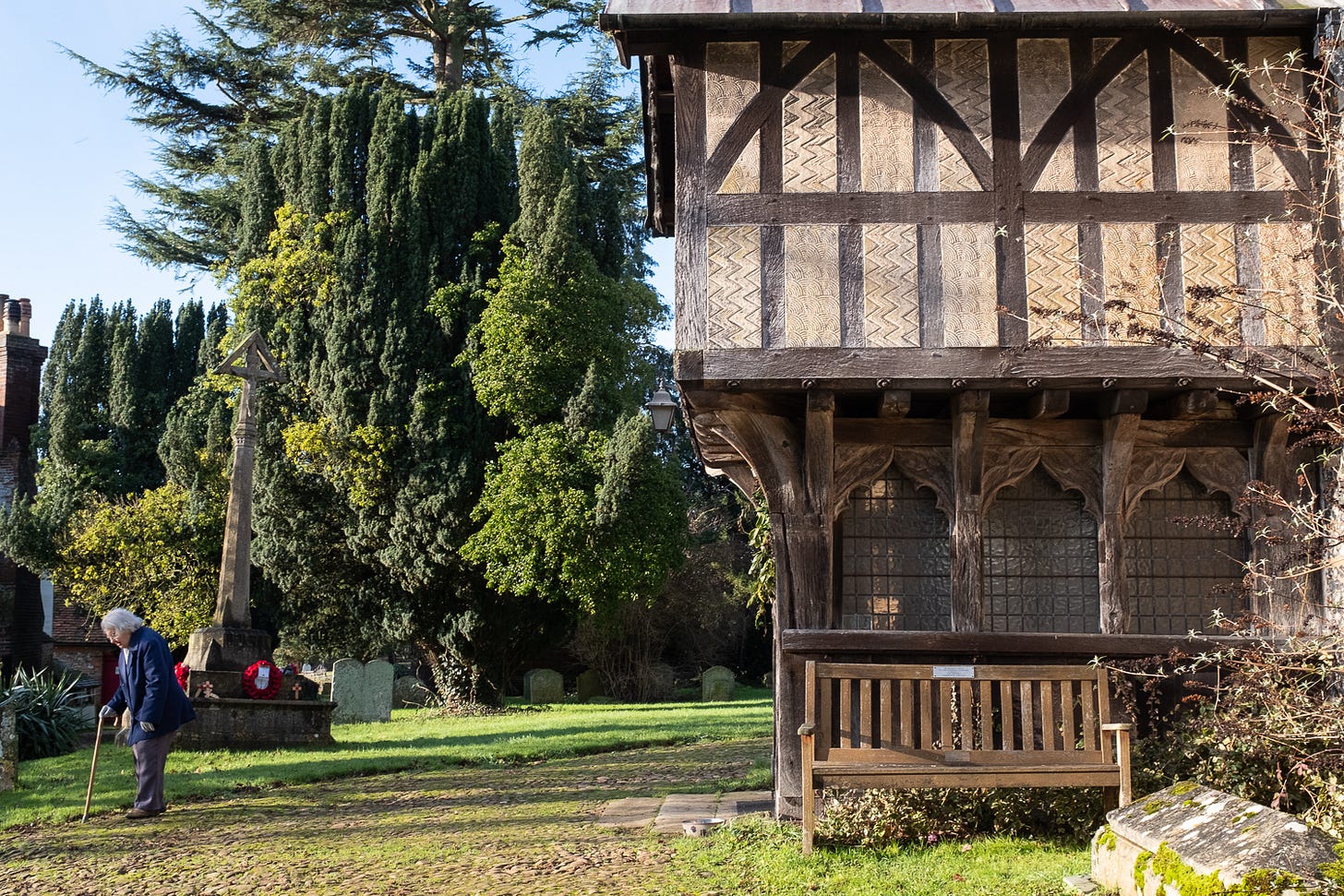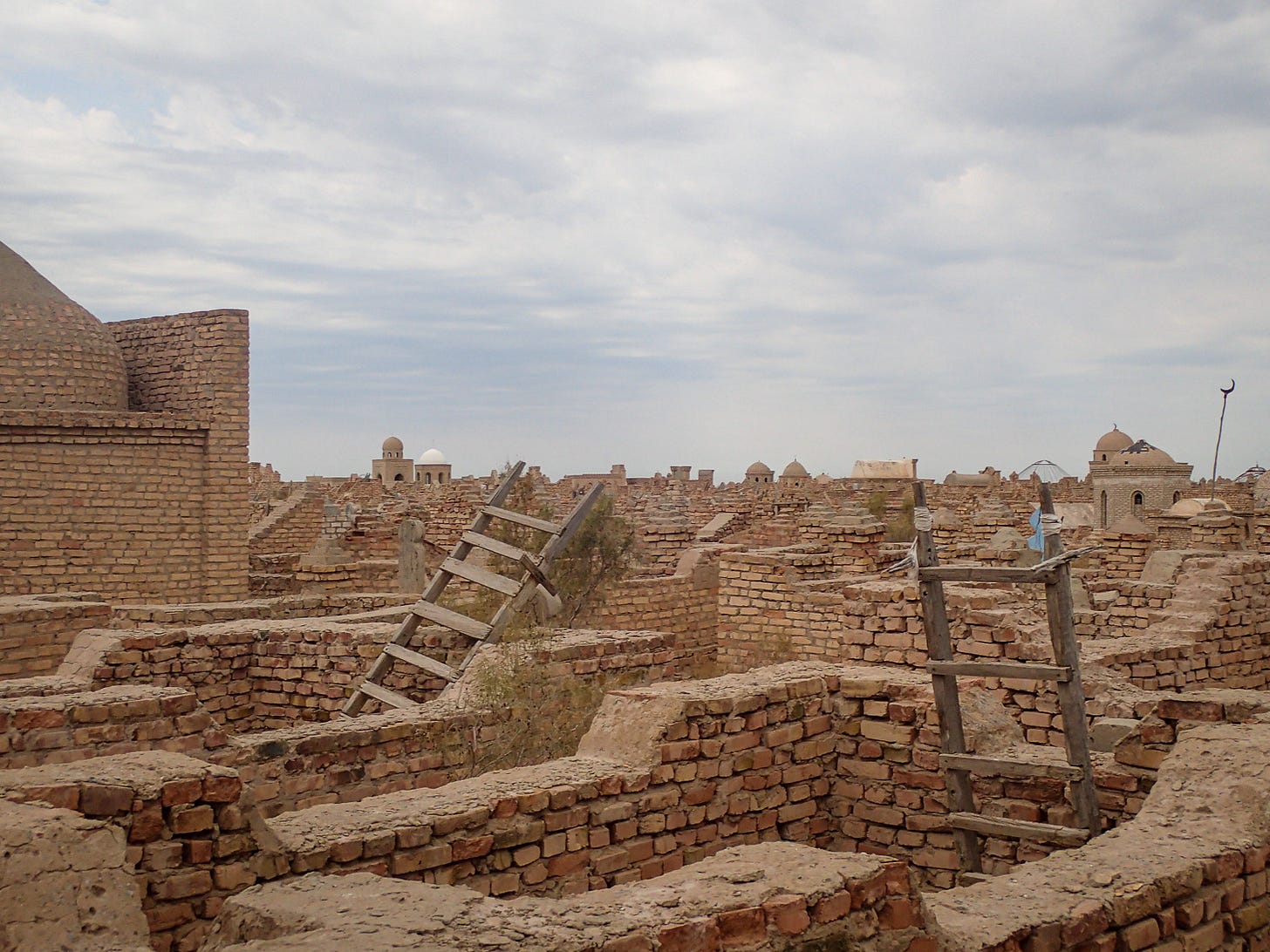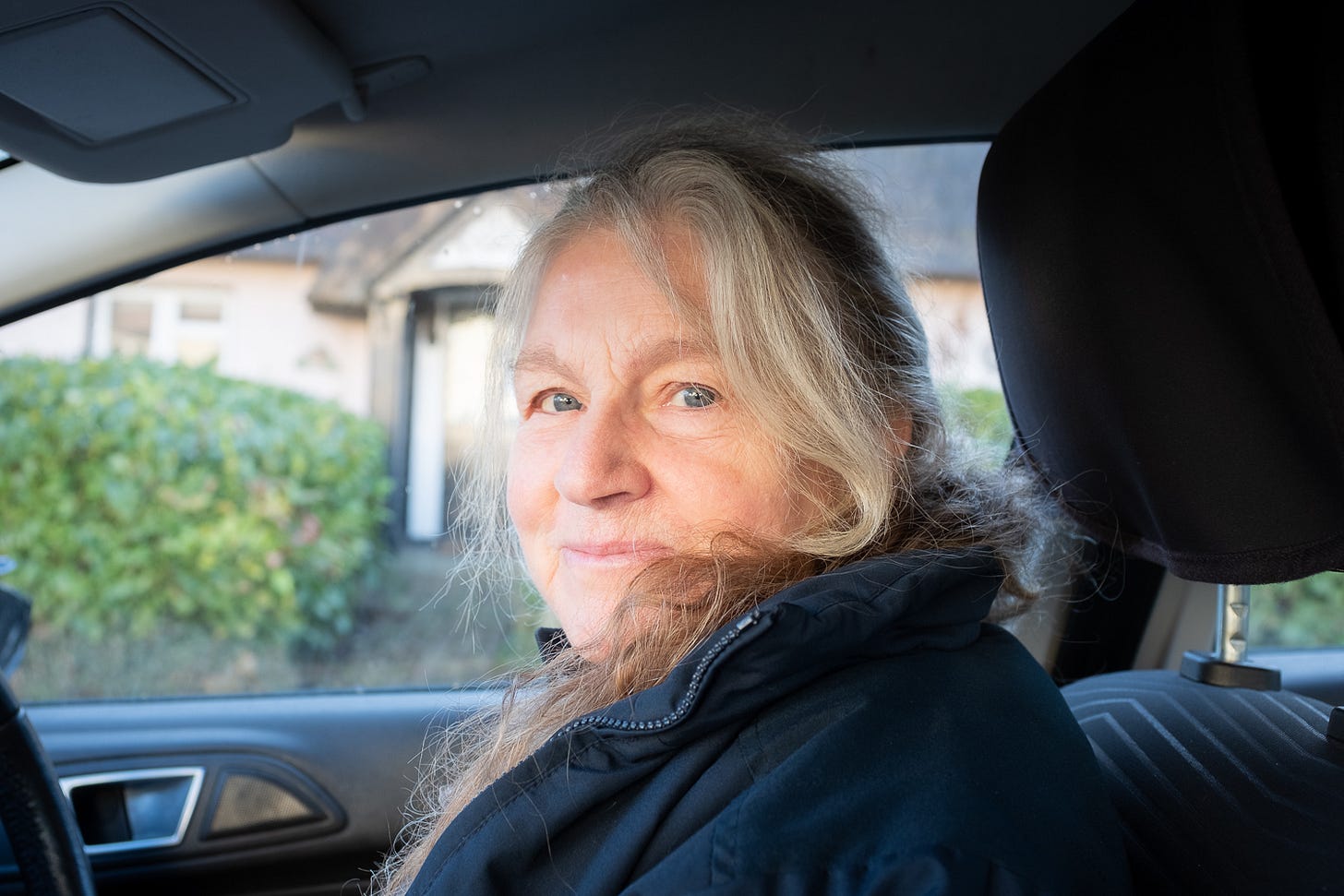Two quick lifts and I was away. Fear God Honour the King the gate to the graveyard said etched heavy on the weathered wood. Gothic yews groped the graves behind, their companions free of leaves. Radwinter church was quiet and there was little there to show. The sun was bright and it pulled me up from the Roman road.
The wooden gate creaked as I entered and creaked back behind me. I walked along the moss-cobbled path, senses heightened. Only graveyards heighten the senses like that. The thought of all those around you. Or maybe it’s the serenity of the church in the middle of it all. This one had an old porch, dark carved wood and pargeted plaster. It drew me in.
An old lady emerged from behind it, on her way somewhere, hunched over a stick. “Beautiful day,” I smiled. She smiled back. She had a tired look about her and a tired way too. I asked how she was.
“Oh, you know,” she tutted, “Not too bad really. Given my age… and everything that’s going on.” She didn’t say what but I knew what she meant. She could have said the same thing at any point in history and anyone would know what she meant. Everything’s always going on and it gets tiring.
Lin got out for a walk every day if she could. Unless the weather was too cold or stormy. She nodded her fine white head sideways and again I knew what she meant. It had been cold the other day.
Radwinter had been home all her life, with its ancient church and Roman road. She’d been alive for a ninth of the church’s life, was christened there and hoped to be buried there too.
“Did you know an American here in the 80s?” I asked, changing the subject, “Called Cedric Robinson?”
She thought on it but didn’t think she did.
I’d come across him the other day in an article. It said he’d spent a few years in the 80s right here in Radwinter. He was an American academic, mostly in the States but came to Cambridge for a few years. His focus was Black radicalism and racial capitalism. His greatest work Black Marxism argued that western capitalism is inherently racist, built on the back of toiling slaves and the colonial oppressed and that it will never escape this intrinsic fact. It was a sweeping re-evaluation of history as we tend to tell it, shifting the focus from Europe and the west to the ‘edges’. The name is misleading. It was in fact an excoriation of Marx and his failure to analyse race adequately. Not only that. Capitalism, Robinson argued, was not the knight that slew feudalism as Marx would have it (ready to be slain itself by communism). Capitalism grew out of it and inherited all its caste-ridden, racist oppressions.
The book sold badly when it was published in 1983 but dog-eared copies were passed between students regardless. Then the South African government, out of the blue, added it to the curriculum when apartheid fell. It was rediscovered and reprinted in the US and UK. Now it’s a Penguin Classic.
Radwinter, of all places, was where he lived while he’d done much of the research. I looked around at the old church and Roman road running down the hill. Where exactly he lived I don’t know. Neither did Lin. “What did he look like?” She asked.
“He was African American but I don’t know much more,” I replied.
“Hmm…One of them,” she narrowed her eyes momentarily, “I did know one American here. Amos Tupper. I’m going to visit his wife’s grave now. She died quite recently but it was about time she went…” she shook her head sorrowfully, then tottered off down the path.
I carried on through the graveyard looking at the graves. Gravestones fallen and cracked, covered in lichen. The modern stones were much shinier, polished even. I wonder what they’ll look like in 300 years.
In Samarkand, there’s a necropolis. Nephews and nieces of Amir Timur, are interred there, under sparkling domes, not far from their uncle the conqueror himself. The 15th-century astronomer, Ulugh Beg, lies there too. But it's the sprawling graves outside that I found most interesting. On the scrappy ground, polished gravestones had photographs etched into them. You could see the faces of everyone in there, as if on TV. Old men in hats, women in headscarves, soldiers with medals, footballers standing one foot on the ball. Children in their beds. It was like standing in a town square. Faces peering at you from all sides.
Gravestones like that must be expensive and must be a modern thing. Out in the country near what’s left of the Aral Sea, there was another necropolis. There were no famous people there and only a few shiny stone photographs. It was instead a patchwork of brick walls clustered on a hill. Like thousands of tiny gardens or pig styes or the ruins of Pompeii. Some had crypts you could walk into, others had flowers, others still had domes and builders on the edge built more. There are a few similar places in British cities with great gothic arches and statues of mourning angels. They’re peaceful, eery places, but the countryside graveyards, like Radwinter’s, are a different thing. Small, subtle, full of mystery. I stayed a while then walked out, Fear God Honour the King, back onto the street.
The road was quiet. It was bank holiday Monday and not yet 11. Kate was one of the few who was out and the winter sun caught on the bonnet as she pulled over.
Kate worked as a complementary massage therapist in a hospice in Cambridge. She had long grey-blond hair and bright blue eyes. We talked about death. Fitting, given I’d spent the morning in a graveyard.
Death’s not something our society is very good at, at least the talking about it part, she thought. I suppose we’re just as good at dying as every other society, with perhaps the exception of Silicon Valley, though I suspect in the end they’ll prove just as good as the rest of us. But we don’t like death nonetheless and don’t talk about it. Maybe it’s because in the words of T.J. Clark “death equals beginning to smell bad.”
Kate thought that was all a shame. She approached the subject from a different angle. One of embrace, not embarrassment. She’d been at the hospice ten years now.
“It sounds weird,” she said, “But I really love it.” She laughed a little. It had made her reconsider her own life and her own mortality. She spoke to her kids about it a lot and felt that was the best way to prepare. Not that she felt she was anywhere near. But, she said, you never know. Were she to get a diagnosis or something, she felt like she was mentally well prepared.
“The anxiety we have with death,” she went on, “is mostly in leaving unfinished business. It’s the things left unsaid we worry about most. If you can talk through those things then death is very natural.” It’s amazing how conversation is all that’s needed sometimes. It has that power.
At the hospice, Kate would massage the patients. Helping in small ways to ease pain, making people comfortable in their final moments. Help administer what Francis Bacon (the old one) called a “fair and easy passage.”
“It’s a bit like being a midwife for death,” Kate mused gently, “Midwives help people into the world and I help them out of it.”
What she loved most was the people she met. The stories they had from entire lifetimes and the reflections they shared on it all. It was wonderful she thought.
“There’s so much about how horrible people are these days,” Kate replied, “So much about how dangerous the world is. But people are amazing! However simple their lives have been it’s a joy and a pleasure to hear their stories. People really are amazing.”
I said it’s a little like hitchhiking. The random connections and brief glimpses into people’s lives. She agreed, having hitchhiked herself in her youth. Nevertheless, there is one main difference. Apart from the odd graveyard, (touch wood) there’s no death involved in hitchhiking…







